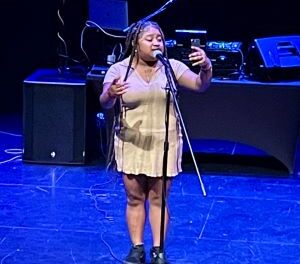Drag performers have become more openly portrayed and accepted over the years, from La Cage aux Folles to RuPaul’s Drag Race, with their personalities and struggles taking on more dimensions and backstories.
Matthew Lopez’s 2015 comedy The Legend of Georgia McBride offers the expected hilarity and entertainment of men in drag, but also includes thoughtful commentary on what putting on a dress does to expand a man’s understanding of his own strengths and prejudices. Honest Pint Theatre Company‘s regional premiere boasts a strong cast, directed to make the most of the comic opportunities while finding the humanity beneath the sitcom-like situations.
Casey is a struggling Elvis imitator who performs nightly at Cleo’s, a rundown bar with few customers on Florida’s Panama City Beach. He’s an out-of-work roofer who can’t pay the rent and whose wife has just found out she’s pregnant. He’s counting on his new Elvis outfit to revive his act, but Cleo’s owner, Eddie, has decided to bring in his drag queen cousin, Miss Tracy Mills, and Tracy’s high-strung cohort, Rexy, to try drumming up some business. Eddie is about to fire Casey when Tracy suggests that Casey tend bar and Eddie emcee the show.
The plan works fine until the night Rexy passes out drunk in the middle of the show. Tracy convinces a very reluctant Casey to take over, reminding him he’s already used to lip-syncing, wearing outlandish costumes and sporting a wig as Elvis. Casey manages to stumble through that performance but has to continue subbing for Rexy, who’s gone for a long drying-out. Tracy teaches Casey the tricks of the trade and helps create his drag name, Georgia McBride. Casey improves weekly, with a resulting uptick in business, but he hasn’t told his wife yet about his new stage role.
Lopez has a real knack for witty banter, knee-slapping one-liners and screwball physical comedy. Although the plot is often clichéd and peopled with stereotypes, the play makes satisfying entertainment when viewed as an adult fable about finding out who you really are.
Honest Pint’s presentation was greatly enhanced by its talented performers. David Henderson’s Tracy projected a no-nonsense, world-weariness, harsh on the surface but kind underneath. His comic timing was spot-on and his drag numbers were all the more hilarious for his subtle control of feminine gestures. He sparred amusingly with Jesse Gephart‘s room-filling Rexy, the character’s outsized personality taken to outrageous extremes without resorting to unbridled silliness. Gephart impressed further by also playing Casey’s beer-guzzling landlord, Jason, with impeccably wrought, low-key humor.
The role of Casey requires the most range and Matthew Hager took it on with commitment and energy. He successfully communicated Casey’s youthful optimism that everything would work out somehow and also his loving devotion to wife and future offspring. Hager credibly put across Casey’s internalized homophobia in several moving scenes involving Tracy and Rexy (allowing Henderson and Gephart some memorable dramatic moments). Hager gamely grappled with all the drag paraphernalia, often dressing up in real time. He played the awkwardness of Casey’s initial forays on stage humorously, but on opening night Hager had not yet fully mastered the sassiness and confidence that Georgia must display as a diva in the latter part of the story, something that should develop after a few more performances.
Tiffany Lewis supplied Casey’s wife Jo with engaging warmth, along with admirable feistiness when reminding her husband of life’s realities. David Klionsky turned in a winning portrait of the gruff bar owner, Eddie, making a neat transition from bumbling announcer to showbiz-y host as the business picked up.
Director Susannah Hough mined the play for continuous laughter, while keeping the zaniness within bounds, making sure the playwright’s more serious points came through. Tab May’s three-part setting of the tawdry backstage dressing room, the show stage with runway lights (half needing bulbs replaced) and Casey and Jo’s dingy apartment, provided suitable backdrops for the action. Anthony Buckner’s appropriate lighting (he also designed the sound) and Shanna Burns’ dressing room and apartment props filled out the setting’s atmosphere.
Morgan Piner is credited as choreographing the big final number, which showed off practiced coordination. The other drag numbers ranged from tightly maneuvered to seemingly under-rehearsed, the latter depleting some of their impact.
The show requires a large crew of dressers and assistants to help the actors with fast changes. Here, LeGrande Smith‘s costumes and Laura J. Parker‘s wig designs were properly campy and wildly fanciful. (Vivica C. Coxx was the drag performance and costume consultant.) Curiously, the costuming and wigs for Casey, once he became the star, seemed less flattering and well-fitted than those for Tracy and Rexy in the same section.
However, these issues shouldn’t deter most theatergoers from having an enjoyable evening of comedy and some heartfelt moments. Honest Pint deserves much credit for mounting this demanding show with such audience-pleasing results.
There is lots more information in two PDFs at the foot of this webpage.
Experience The Legend of Georgia McBride across the next two weekends. For details, see the sidebar.
Note for the record: Matthew Hager is CVNC‘s theatre editor and intern coordinator. He had nothing to do with the production of this commentary.











